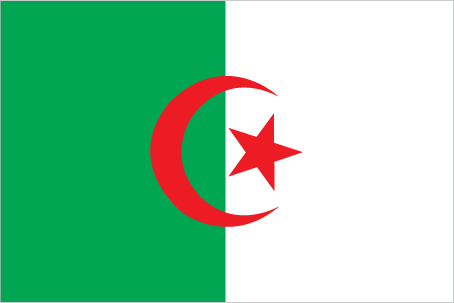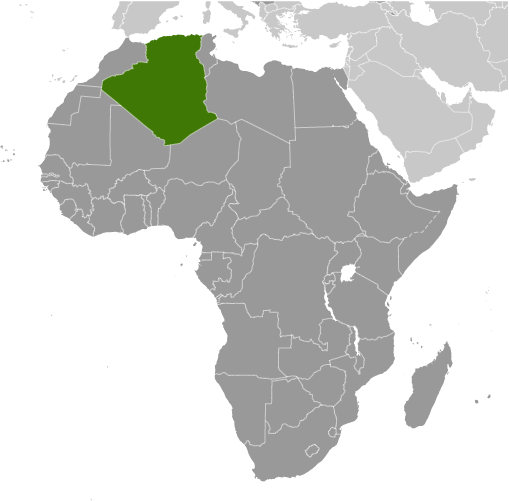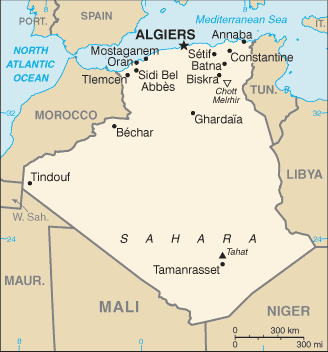After more than a century of rule by France, Algerians fought through much of the 1950s to achieve independence in 1962. Algeria's primary political party, the National Liberation Front (FLN), has dominated politics ever since. Many Algerians in the subsequent generation were not satisfied, however, and moved to counter the FLN's centrality in Algerian politics. The surprising first round success of the Islamic Salvation Front (FIS) in the December 1991 balloting spurred the Algerian army to intervene and postpone the second round of elections to prevent what the secular elite feared would be an extremist-led government from assuming power. The army began a crackdown on the FIS that spurred FIS supporters to begin attacking government targets. The government later allowed elections featuring pro-government and moderate religious-based parties, but this did not appease the activists who progressively widened their attacks. The fighting escalated into an insurgency, which saw intense fighting between 1992-98 resulting in over 100,000 deaths - many attributed to indiscriminate massacres of villagers by extremists. The government gained the upper hand by the late-1990s and FIS's armed wing, the Islamic Salvation Army, disbanded in January 2000. Abdelaziz BOUTEFLIKA, with the backing of the military, won the presidency in 1999 in an election widely viewed as fraudulent and was reelected in a landslide victory in 2004. BOUTEFLIKA was overwhelmingly reelected to a third term in 2009 after the government amended the constitution in 2008 to remove presidential term limits. Longstanding problems continue to face BOUTEFLIKA, including large-scale unemployment, a shortage of housing, unreliable electrical and water supplies, government inefficiencies and corruption, and the continuing activities of extremist militants. The Salafist Group for Preaching and Combat (GSPC) in 2006 merged with al-Qai'da to form al-Qai'da in the Lands of the Islamic Maghreb, which has launched an ongoing series of kidnappings and bombings - including high-profile, mass-casualty suicide attacks targeting the Algerian Government and Western interests.
Country Name
Conventional long form:People's Democratic Republic of Algeria
Conventional short form:Algeria
Local long form:Al Jumhuriyah al Jaza'iriyah ad Dimuqratiyah ash Sha'bi
Local short form: Al Jaza'ir
Government Type
republic
Capital
Name:Algiers
Geographic coordinates: 36 45 N, 3 03 E
Time difference:UTC+1 (6 hours ahead of Washington, DC during Standard Time)
Administrative divisions
48 provinces (wilayat, singular - wilaya); Adrar, Ain Defla, Ain Temouchent, Alger, Annaba, Batna, Bechar, Bejaia, Biskra, Blida, Bordj Bou Arreridj, Bouira, Boumerdes, Chlef, Constantine, Djelfa, El Bayadh, El Oued, El Tarf, Ghardaia, Guelma, Illizi, Jijel, Khenchela, Laghouat, Mascara, Medea, Mila, Mostaganem, M'Sila, Naama, Oran, Ouargla, Oum el Bouaghi, Relizane, Saida, Setif, Sidi Bel Abbes, Skikda, Souk Ahras, Tamanghasset, Tebessa, Tiaret, Tindouf, Tipaza, Tissemsilt, Tizi Ouzou, Tlemcen
Independence
5 July 1962 (from France)
National Holiday
Revolution Day, 1 November (1954)
Constitution
8 September 1963; revised 19 November 1976; effective 22 November 1976; revised 3 November 1988, 23 February 1989, 28 November 1996, 10 April 2002, and 12 November 2008
Legal system
socialist, based on French and Islamic law; judicial review of legislative acts in ad hoc Constitutional Council composed of various public officials including several Supreme Court justices; has not accepted compulsory ICJ jurisdiction
Suffrage
18 years of age; universal
Executive branch
Chief of state:President Abdelaziz BOUTEFLIKA (since 28 April 1999) note - the president is both the chief of state and head of government; a November 2008 constitutional amendment separated the position of head of government from that of the prime minister
Head of government: President Abdelaziz BOUTEFLIKA (since 28 April 1999)
Cabinet:Cabinet of Ministers appointed by the president
(For more information visit the World Leaders website)
Elections:president elected by popular vote for a five-year term; note - a November 2008 constitutional amendment abolished presidential term limits; election last held on 9 April 2009 (next to be held in April 2014)
Election results:Abdelaziz BOUTEFLIKA was reelected president for a third term; percent of vote - Abdelaziz BOUTEFLIKA 90.2%, Louisa HANOUNE 4.2%, Moussa TOUATI 2.3%, Djahid YOUNSI 1.4%, Ali Fawzi REBIANE less than 1%, Mohamed SAID less than 1%
Legislative branch
bicameral Parliament consists of the Council of the Nation (upper house; 144 seats; one-third of the members appointed by the president, two-thirds elected by indirect vote to serve six-year terms; the constitution requires half the Council to be renewed every three years) and the National People's Assembly (lower house; 389 seats; members elected by popular vote to serve five-year terms)
Elections:Council of the Nation - last held on 29 December 2009 (next to be held in December 2012); National People's Assembly - last held on 17 May 2007 (next to be held in 2012)
Election results:Council of the Nation - percent of vote by party - NA; seats by party - NA; National People's Assembly - percent of vote by party - NA; seats by party - FLN 136, RND 61, MSP 52, PT 26, RCD 19, FNA 13, other 49, independents 33;
Judicial branch
Supreme Court
Political Parties and Leaders
Ahd 54 [Ali Fauzi REBAINE]; Algerian National Front or FNA [Moussa TOUATI]; National Democratic Rally (Rassemblement National Democratique) or RND [Ahmed OUYAHIA]; National Liberation Front or FLN [Abdelaziz BELKHADEM, secretary general]; National Reform Movement or Islah [Ahmed ABDESLAM] (formerly MRN); Rally for Culture and Democracy or RCD [Said SADI]; Renaissance Movement or EnNahda Movement [Fatah RABEI]; Socialist Forces Front or FFS [Hocine Ait AHMED]; Society of Peace Movement or MSP [Boudjerra SOLTANI]; Workers Party or PT [Louisa HANOUNE]
note: a law banning political parties based on religion was enacted in March 1997
Political pressure groups and leaders
The Algerian Human Rights League or LADDH [Hocine ZEHOUANE]; SOS Disparus [Nacera DUTOUR]
International organization participation
ABEDA, AfDB, AFESD, AMF, AMU, AU, BIS, FAO, G-15, G-24, G-77, IAEA, IBRD, ICAO, ICC, ICCt (signatory), ICRM, IDA, IDB, IFAD, IFC, IFRCS, IHO, ILO, IMF, IMO, IMSO, Interpol, IOC, IOM, IPU, ISO, ITSO, ITU, ITUC, LAS, MIGA, MONUC, NAM, OAPEC, OAS (observer), OIC, OPCW, OPEC, OSCE (partner), UN, UNCTAD, UNESCO, UNHCR, UNIDO, UNITAR, UNWTO, UPU, WCO, WFTU, WHO, WIPO, WMO, WTO (observer)
Diplomatic representation in the US
Chief of mission:Ambassador Abdallah BAALI
Chancery:2118 Kalorama Road NW, Washington, DC 20008
Telephone:[1] (202) 265-2800
FAX:[1] (202) 667-2174
Diplomatic representation from the US
Chief of mission: Ambassador David D. PEARCE
Embassy:05 Chemin Cheikh Bachir, El-Ibrahimi, El-Biar 16000 Algiers
Mailing address: B. P. 408, Alger-Gare, 16030 Algiers
Telephone:[213] 770-08-2000
FAX:[213] 21-60-7355
Flag description
two equal vertical bands of green (hoist side) and white; a red, five-pointed star within a red crescent centered over the two-color boundary; the colors represent Islam (green), purity and peace (white), and liberty (red); the crescent and star are also Islamic symbols, but the crescent is more closed than those of other Muslim countries because the Algerians believe the long crescent horns bring happiness





















